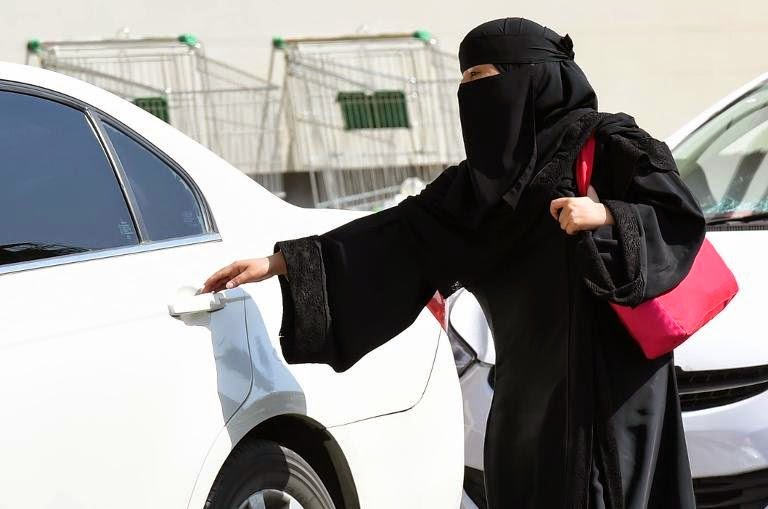AFP story on the driving demo day, October 26, 2014. Story filed on 10/26/14. A link to the story is here. Text below.
 |
| A Saudi woman gets into a taxi in the city of Riyadh on October 26, 2014, as a online campaign continues to call for an end to the driving ban for women in the country Photo by Fayez Nureldine |
Riyadh (AFP) - Activists pushing for women's right-to-drive in Saudi Arabia declared their online campaign a success Sunday, in the world's only country where women are not allowed to operate cars.
The campaign that began last year and revved up again since the beginning of the month encouraged women to post online images of themselves driving. Dozens of women have driven and posted during the latest campaign, one activist said, although she knew of only two who hit the streets Saturday and Sunday as the campaign peaked. "
A day hasn't gone by without receiving one or two videos" of women driving, said the activist.
Men and women have also posted messages of support. More than 2,800 people have signed an online petition at www.oct26driving.com asking authorities to lift the ban on women driving.
The activist said she did not want to be named because the interior ministry has threatened her with arrest if she speaks publicly about the campaign.
Last year, activists also focused their demands on October 26, when at least four driving videos were posted on YouTube.
Sixteen or more women were fined for taking the wheel on that day.
There is a "huge risk" for female drivers, the activist said when asked why more had not posted images of themselves this year.
Women have previously been arrested, cars have been confiscated, and one received 100 lashes, she alleged. "So, women are afraid," the activist said.
She added that, apart from driving, the campaign is also about "creating a storm" over the issue.
On Thursday the interior ministry issued a warning to would-be female drivers and their supporters.
The ministry said it would "strictly implement" measures against anyone who "contributes in any manner or by any acts, towards providing violators with the opportunity to undermine the social cohesion".
That means the campaign has had an impact, the activist said. "I think it's pretty successful. If we're getting a reaction, that means we're effective."
A conservative Saudi Arabian cleric has said women who drive risk damaging their ovaries and bearing children with clinical problems, countering activists who are trying to end the Islamic kingdom's male-only driving rules.
'Half a citizen' Sahar Nasief defied the warnings and got behind the wheel anyway on Sunday.
"The roads were full of police cars... everybody was on alert," she told AFP from the Red Sea city of Jeddah after running a 15-minute errand in her car because her driver wasn't available.
The authorities' response shows the driving campaign has been "very successful," she agreed.
"Its sad that you live in a country where you feel like half a citizen, that you are a threat to national security," another driver said in a YouTube video posted on Saturday.
Dressed in black with only her eyes exposed, she said she was driving in Riyadh on the weekend. Saudi women are required to dress in black from head to toe and still need permission from a male guardian to work and marry. Activists say women's driving is not against the law.
Tradition and custom are behind the prohibition, which is not backed up by an Islamic text or judicial ruling, the online petition states. But activists said they feel the conservative society is becoming more accepting of women motorists.
"A lot of people now are for the campaign," Nasief said. Another activist, Aziza al-Yussef, said people notice that she is a woman driver and don't seem to care.
"We are just waiting for a decree from the king to allow it," she said, optimistic that a change is coming.
Hardline clerics protested when King Abdullah, in January last year, decided to give women a 20 percent quota in the previously all-male Shura Council, an advisory body.
The unnamed activist said "it's hard to say" if women are closer to the right to drive.
In the meantime activists say they will keep raising their voices, and getting behind the wheel.
No comments:
Post a Comment